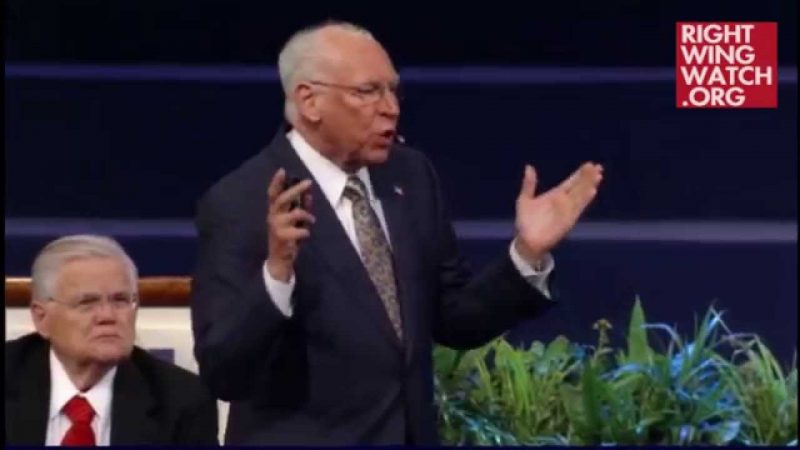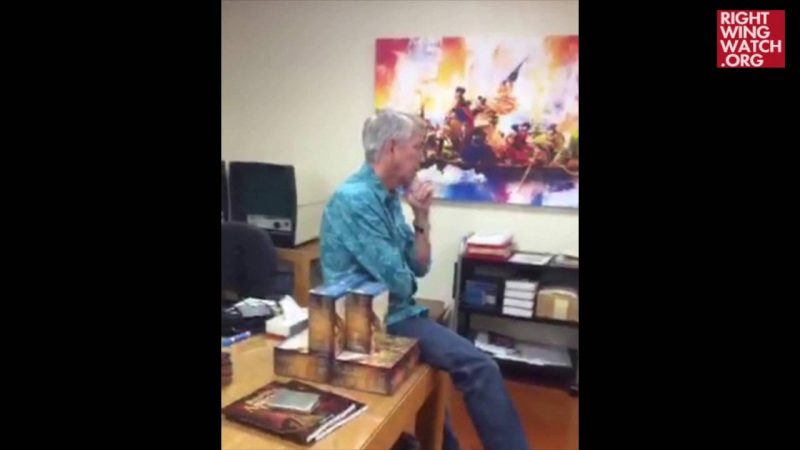Just last month, we wrote a long post exposing the way in which David Barton routinely misrepresents court cases in an effort to support his pseudo-history and promote his cultural and political agenda. Today, we came across another instance of Barton doing the same thing with a different court case while delivering a presentation a few weeks ago at Calvary Chapel in San Jose, California.
Barton was making the case that, until the Supreme Court’s decision in Abington Township v. Schempp in 1963 — which Barton also routinely misrepresents — teaching the Bible in public schools had been the norm. To support this point, Barton cited the Supreme Court’s 1844 ruling in a case called Vidal v. Girard’s Executors, which he claimed declared that no school that refused to teach the Bible could receive public funds:
“We look at Christian schools today,” Barton said, “and we think that’s alternative education. No, no, no. Christians schools is mainstream education. Secular education is brand new in America. We never had that before. That’s the new thing … In 1844, the U.S. Supreme Court had case called Vidal v. Girard’s Executors and what you had was a government-operated school that was not going to teach the Bible and the Supreme Court came back with an unanimous 8-0 decision and the Supreme Court said well, if you don’t want to teach the Bible, you don’t have to teach the Bible but you do have to become a private school. We’re not going to fund any public school that won’t teach the Bible.
As usual, if you actually take the time to read this case, the facts in no way support Barton’s interpretation.
The case involved an extremely wealthy man named Stephen Girard who, as a childless widower, left in his will large sums of money to the City of Philadelphia for various civic improvements, as well as money to establish a school for “poor male white orphan children.”
Among the stipulations Girard placed upon the school was that no religious leader was ever to hold a position there, nor could any specific denominational doctrine be taught:
I enjoin and require that no ecclesiastic, missionary, or minister of any sect whatsoever shall ever hold or exercise any station or duty whatever in the said college, nor shall any such person ever be admitted for any purpose, or as a visitor, within the premises appropriated to the purposes of the said college.
In making this restriction, I do not mean to cast any reflection upon any sect or person whatsoever, but as there is such a multitude of sects and such a diversity of opinion amongst them, I desire to keep the tender minds of the orphans who are to derive advantage from this bequest free from the excitement which clashing doctrines and sectarian controversy are so apt to produce; my desire is that all the instructors and teachers in the college shall take pains to instill into the minds of the scholars the purest principles of morality, so that, on their entrance into active life, they may, from inclination and habit, evince benevolence towards their fellow creatures and a love of truth, sobriety, and industry, adopting at the same time such religious tenets as their matured reason may enable them to prefer.
Some of Girard’s heirs then sued on various technical grounds that are not germane to Barton’s point, as well as by arguing that prohibiting clergy from working or teaching at the school was a violation of both the Constitution and the Common Law because it discriminated against Christianity.
The Supreme Court unanimously rejected this argument:
All that we can gather from his language is that he desired to exclude sectarians and sectarianism from the college, leaving the instructors and officers free to teach the purest morality, the love of truth, sobriety, and industry, by all appropriate means, and of course including the best, the surest, and the most impressive. The objection, then, in this view, goes to this — either that the testator has totally omitted to provide for religious instruction in his scheme of education (which, from what has been already said, is an inadmissible interpretation), or that it includes but partial and imperfect instruction in those truths. In either view can it be truly said that it contravenes the known law of Pennsylvania upon the subject of charities, or is not allowable under the article of the bill of rights already cited? Is an omission to provide for instruction in Christianity in any scheme of school or college education a fatal defect, which avoids it according to the law of Pennsylvania? If the instruction provided for is incomplete and imperfect, is it equally fatal? These questions are propounded because we are not aware that anything exists in the Constitution or laws of Pennsylvania or the judicial decisions of its tribunals which would justify us in pronouncing that such defects would be so fatal. Let us take the case of a charitable donation to teach poor orphans reading, writing, arithmetic, geography, and navigation, and excluding all other studies and instruction; would the donation be void, as a charity in Pennsylvania, as being deemed derogatory to Christianity? Hitherto it has been supposed that a charity for the instruction of the poor might be good and valid in England even if it did not go beyond the establishment of a grammar school. And in America, it has been thought, in the absence of any express legal prohibitions, that the donor might select the studies, as well as the classes of persons, who were to receive his bounty without being compellable to make religious instruction a necessary part of those studies. It has hitherto been thought sufficient, if he does not require anything to be taught inconsistent with Christianity.
Looking to the objection therefore in a mere juridical view, which is the only one in which we are at liberty to consider it, we are satisfied that there is nothing in the devise establishing the college, or in the regulations and restrictions contained therein, which are inconsistent with the Christian religion or are opposed to any known policy of the State of Pennsylvania.
This view of the whole matter renders it unnecessary for us to examine the other and remaining question, to whom, if the devise were void, the property would belong, whether it would fall into the residue of the estate devised to the city, or become a resulting trust for the heirs at law.
Upon the whole, it is the unanimous opinion of the Court that the decree of the Circuit Court of Pennsylvania dismissing the bill, ought to be affirmed, and it is accordingly.
Barton’s representation of this case is entirely false, as it had literally nothing to do with the teaching of the Bible nor any requirement that schools must do so in order to receive public funds.
Despite the fact that his claims are totally false, Barton will nonetheless continue to make them in future presentations, secure in the knowledge that his Religious Right supporters will never hold him accountable for his misinformation and misrepresentations.








